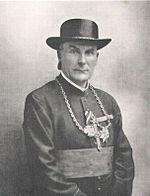Michael von Faulhaber, Date of Birth, Place of Birth, Date of Death
TweetMichael von Faulhaber
German Roman Catholic CardinalAbout Michael von Faulhaber
- Michael Cardinal Ritter von Faulhaber (5 March 1869 – 12 June 1952) was a senior Catholic prelate and Archbishop of Munich for 35 years, from 1917 to his death in 1952.
- Cardinal von Faulhaber rejected the Weimar Republic as rooted in treason and opposed democratic government in general, favoring a Catholic monarchy.
- Faulhaber publicly recognized the Nazi government as legitimate, required Catholic clergy to remain loyal to the Nazi government, and maintained bridges between fascism and the Church.
- He ordained Joseph Ratzinger (future Pope Benedict XVI) as a priest in 1951, and was the last surviving Cardinal appointed by Pope Benedict XV.Faulhaber is a controversial figure.
- Catholic apologists have sought to portray him as a committed anti-Nazi.
- Others have highlighted his collusion.
- In 2017 the Bund fur Geistesfreiheit Munchen, in an open letter demanding the renaming of the Cardinal-Faulhaber-Strasse, called it unbearable that an antisemite like Faulhaber should still be honoured with a street name.
- In a September 1933 diary entry Faulhaber had written that he hoped Hitler would succeed in doing what Bismarck had failed to do and 'eradicate the evil of the parliamentary democratic system'.
- The open letter cited Faulhaber's antisemitic hatred of Kurt Eisner, his 1936 extension to the Nazi regime the right to 'take action against the excesses of Judaism in his area', his proclamation in 1936 of 'the unanimous commitment of the German bishops to the Fuhrer and his world historical work' and his 1938 call for Catholics 'to make a vow of allegiance to the Fuhrer in the hour of world history'.
Read more at Wikipedia
See Also
- Famous People's Birthdays on 05 March, Germany
- Famous People's Birthdays in March, Germany
- Famous Catholic priest's Birthdays on 05 March, Germany
- Famous Catholic priest's Birthdays in March, Germany
- Famous theologian's Birthdays on 05 March, Germany
- Famous theologian's Birthdays in March, Germany
- Famous resistance fighter's Birthdays on 05 March, Germany
- Famous resistance fighter's Birthdays in March, Germany
- Famous university teacher's Birthdays on 05 March, Germany
- Famous university teacher's Birthdays in March, Germany


 Date of Birth:
Date of Birth:  Place of Birth: Bavaria, Germany
Place of Birth: Bavaria, Germany